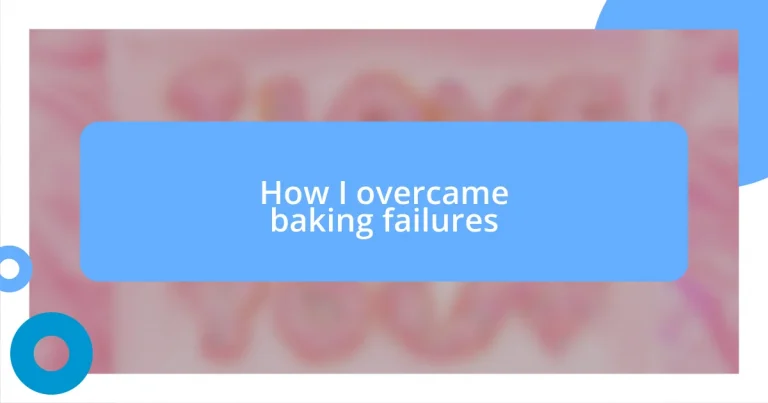Key takeaways:
- Understanding the science of baking, including ingredient roles and temperature, is crucial for successful outcomes.
- Learning from baking failures and analyzing mistakes can lead to growth and improved techniques.
- Establishing a consistent baking routine fosters confidence and creativity in the kitchen.
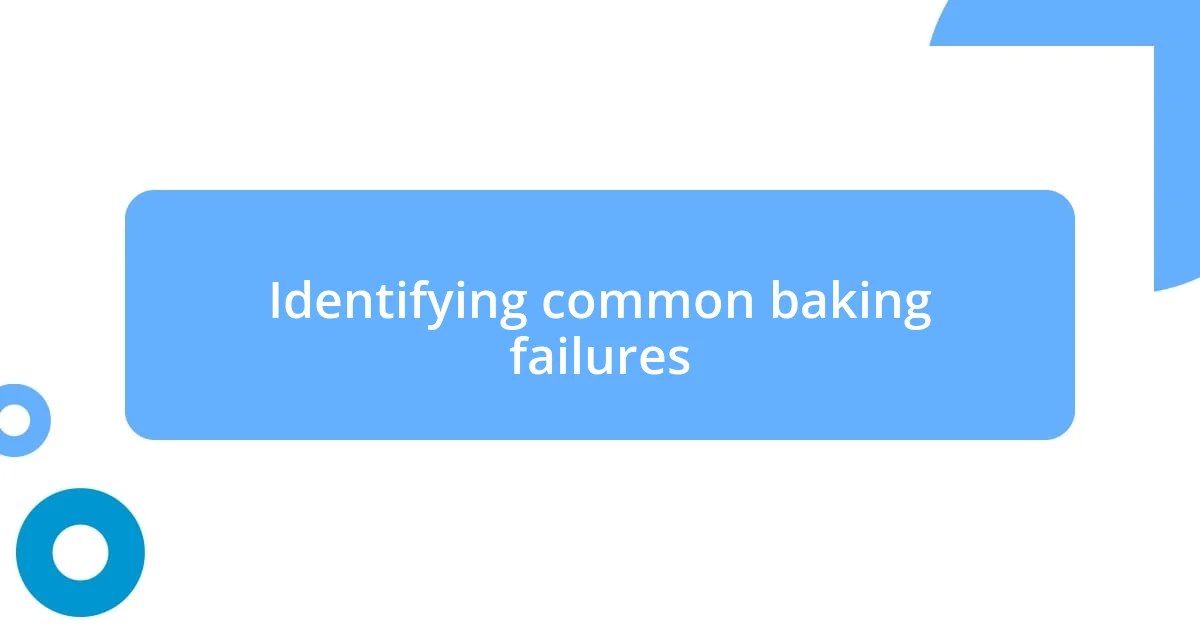
Identifying common baking failures
Baking failures can range from the minor to the complete disaster, and I’ve experienced them all. One of the most recurring issues I’ve faced is bread that simply won’t rise. Every time I encountered this, I wondered: did I kill the yeast by using water that was too hot? It took me a while to recognize that the temperature of my ingredients plays a vital role—in fact, it can make or break your bread!
Another common pitfall I’ve noticed is cakes that end up dense instead of light and airy. I remember a chocolate cake that turned out more like a brick than a dessert. It was frustrating to slice into it and find that it had sunk in the middle, and I realized later that I hadn’t measured my baking powder accurately. Who knew something so small could create such a mammoth problem?
And let’s not forget those moments when cookies spread out too much in the oven. I used to think that a slightly sticky dough couldn’t hurt, but I learned the hard way that chilling the dough can make all the difference. Watching my beautiful cookie dreams turn into puddles left me both heartbroken and determined to dive deeper into the science of baking. Have you felt that sting of disappointment too? It’s all part of the learning curve, isn’t it?
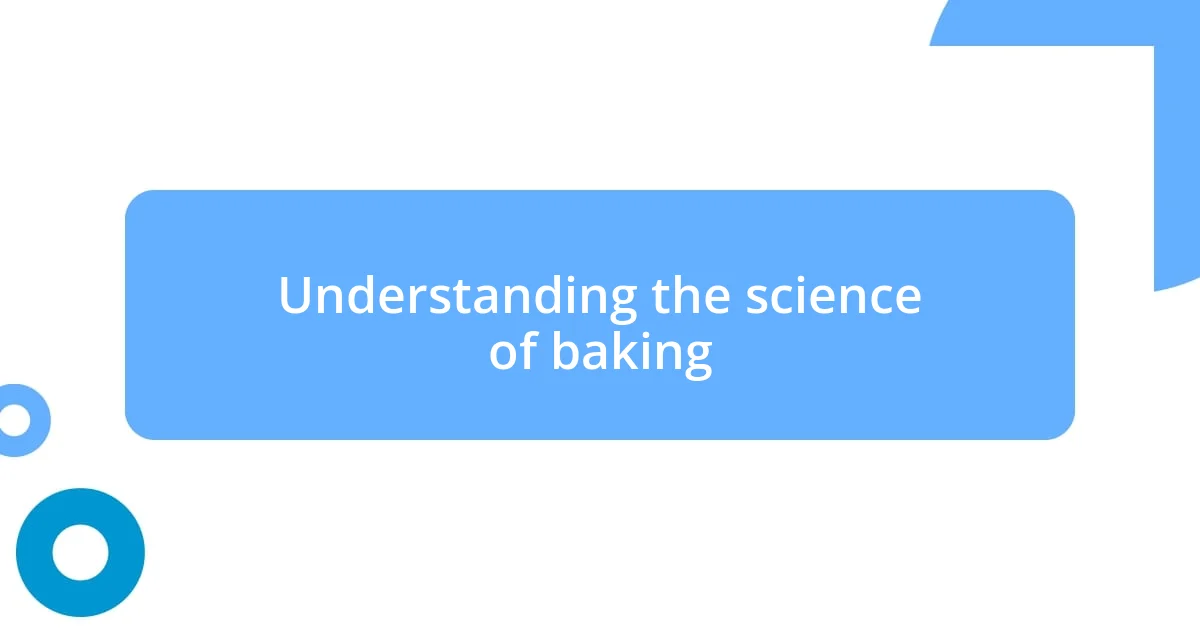
Understanding the science of baking
Baking is more than just mixing ingredients; it’s a dance of chemistry in the kitchen. I remember the first time I made macarons—what a flop! My first attempts resulted in hollow shells while others turned into a sticky mess. It was a true testament to understanding how moisture levels, humidity, and egg whites whip up differently not only in taste but in texture as well. I realized that mastering macaron-making starts with knowing how to manage these elements, which can dramatically affect the outcome and satisfaction of the final product.
When I bake, I think about the role of leavening agents. Each time I pull out my baking soda or baking powder, I’m reminded of the time I got overly excited and added both. My cake turned out more like volcanic rock than a fluffy dessert! It was a learning moment, emphasizing that the balance of these agents not only makes things rise but also influences texture and flavor. It’s like a symphony; every ingredient plays a role, and missing even one note can leave you with an incomplete melody.
I find that understanding the science behind baking is just as crucial as the recipes themselves. The difference in outcomes can often be traced back to these fundamental principles. How many times have I cried over a failed soufflé? Enough that I can assure you it wasn’t just my technique; it was also about the temperature of my ingredients and the air I was gently folding in. It’s in these moments of struggle that we really see how crucial these baking fundamentals are to our successes.
| Ingredient | Impact on Baking |
|---|---|
| Yeast | Helps dough rise; needs proper temperature and food (sugar) to activate. |
| Baking Powder | Provides leavening; must be fresh to be effective, and needs moisture to activate. |
| Eggs | Add moisture and structure; the way they’re beaten affects air incorporation and final texture. |
| Flour | Provides structure; different types (cake, bread, all-purpose) yield different results when baked. |
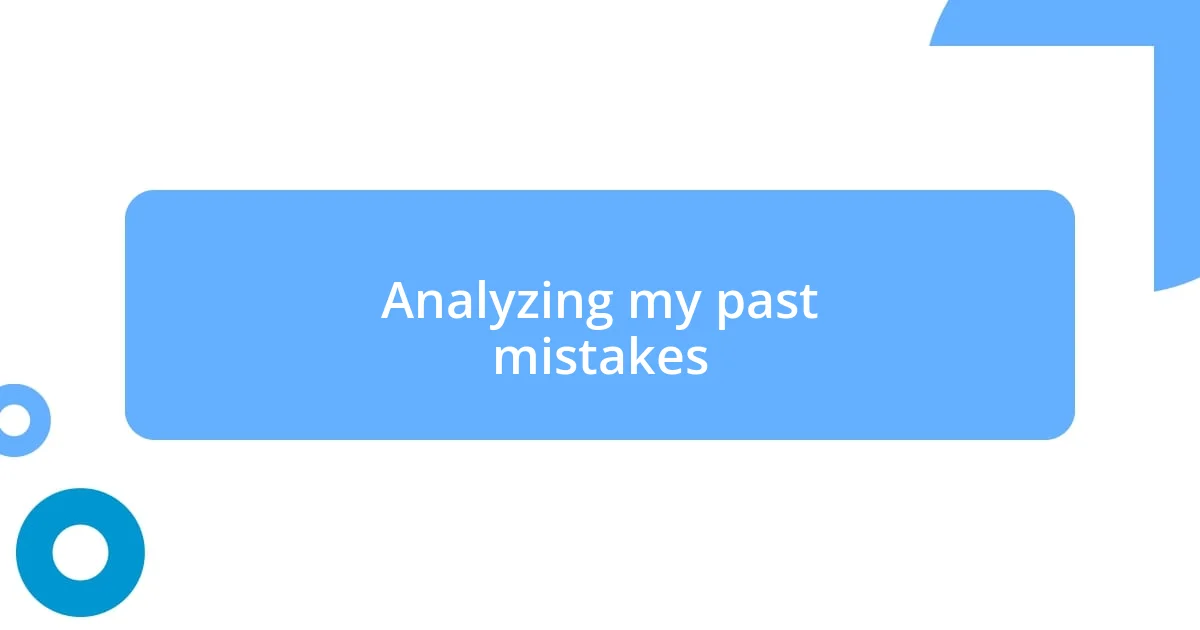
Analyzing my past mistakes
I often find that reflecting on my past mistakes in baking reveals invaluable lessons. For instance, there was a time when I proudly prepared a batch of banana bread, only to discover it was raw in the middle. I had neglected to adjust my baking time based on the size of the loaf. It was a crushing moment, but it taught me the importance of knowing my oven and the baking conditions. Every misstep has carved a clearer path for future successes.
- Yeast Mismanagement: I recall an evening when I forgot to activate my yeast properly, leading to a dense loaf that was like a brick.
- Overmixing: One chocolate chip cookie disaster came from overmixing the dough, yielding tough cookies instead of the chewy perfection I craved.
- Pan Size Errors: I’ll never forget the time I used a smaller pan for a cake recipe, resulting in overflowing batter and a messy oven.
Every failure, no matter how disheartening, contributes to my growth as a baker. Understanding these mistakes arms me with knowledge, ensuring that I approach each new recipe with a mix of excitement and caution—ready to learn, ready to succeed.
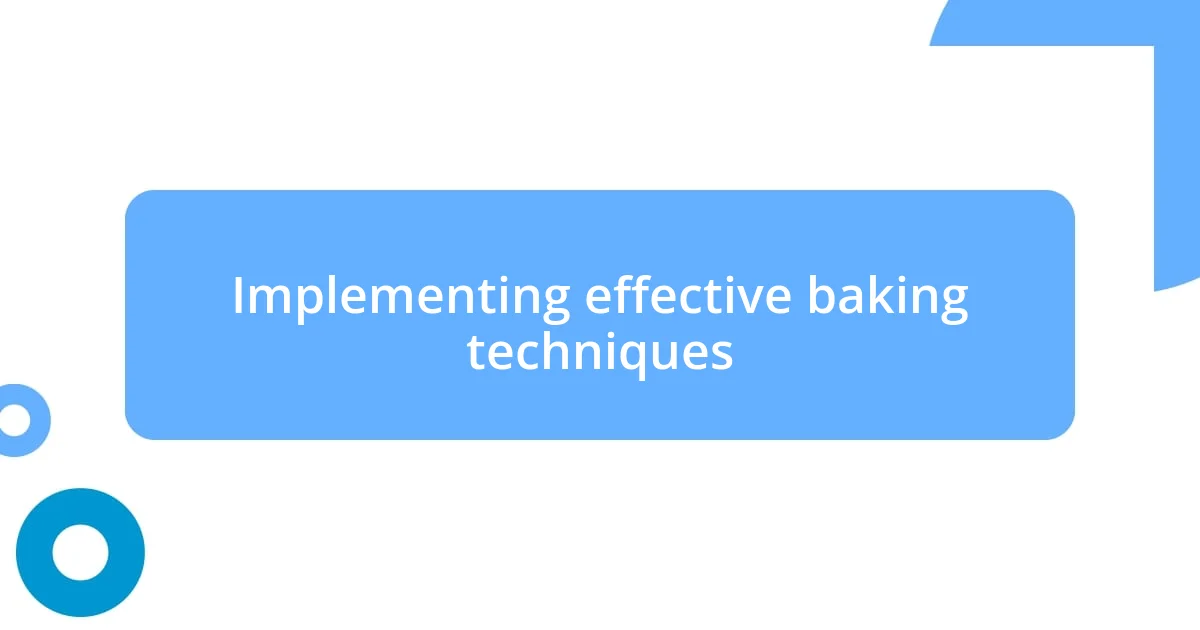
Implementing effective baking techniques
I’ve discovered that adopting effective baking techniques often means honing in on the details. For instance, I distinctly remember the first time I tried to bake a layered cake. I didn’t think twice about using room-temperature ingredients, and let me tell you, the difference was startling! The cakes didn’t rise as they should have, and my feelings were deflated along with my baking confidence. The lesson here is clear: prepping and ensuring ingredients are at optimal temperatures can truly enhance texture and flavor.
Another critical technique I now swear by is the importance of precise measurements. I’ll never forget the period when I used a standard cup to scoop flour, thinking it wouldn’t matter. Boy, was I wrong! My cookies became an absolute disaster—hard as rocks instead of the soft delights I envisioned. It was a poignant reminder that baking is so much about accuracy. Measuring devices, like food scales, can transform your baking game, making each creation reliable and enjoyable.
I also emphasize the significance of patience while baking. There was a moment when I rushed the chilling process for a dough, and the result was a sad, flat tart that didn’t hold together. I find myself asking: Why do we often ignore the simplest steps? That little wait can make all the difference. Adopting a mindset that values each step, even the waiting ones, allows us to savor the journey, making baking not just an act, but an experience.
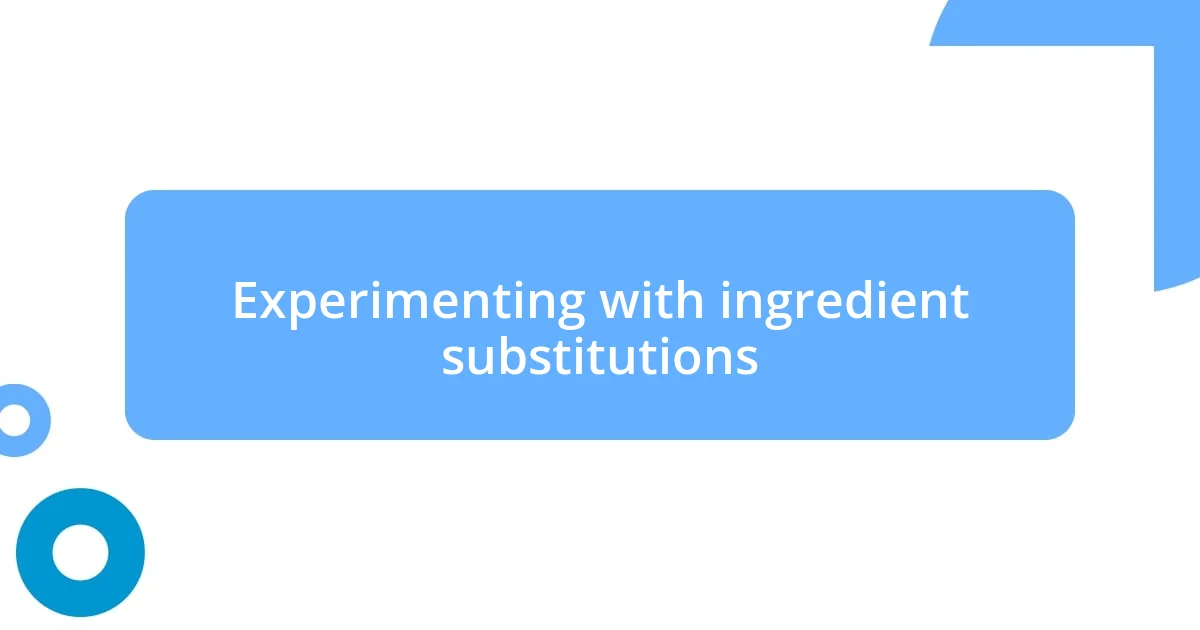
Experimenting with ingredient substitutions
Experimenting with ingredient substitutions has been a game changer for me in the kitchen. I remember the first time I decided to swap out all-purpose flour for almond flour in my muffins. The result was a nutty flavor that was unexpected but delightful! Have you ever tried a substitution that turned out surprisingly well? I now see substitutions as an opportunity to explore new flavors and textures, making each baking session feel like an exciting adventure.
Another fascinating moment for me was when I ran out of eggs while making a cake. Instead of rushing to the store, I opted for a flaxseed meal substitute. To my amazement, the cake turned out moist and flavorful! It made me realize how resourceful and creative we can be, even in a pinch. It’s moments like these that remind me baking is not just about following recipes but also about being open to experimentation.
I’ve also found that swapping ingredients often leads to healthier options. The time I replaced sugar with mashed bananas in my pancake batter was a revelation. Not only did I cut down on refined sugar, but the pancakes were incredibly moist and tasty! So, could ingredient substitutions be the key to unlocking better health in our favorite baked goods? I truly believe they bring both joy and surprise into the baking process, reminding us that innovation can be delicious.
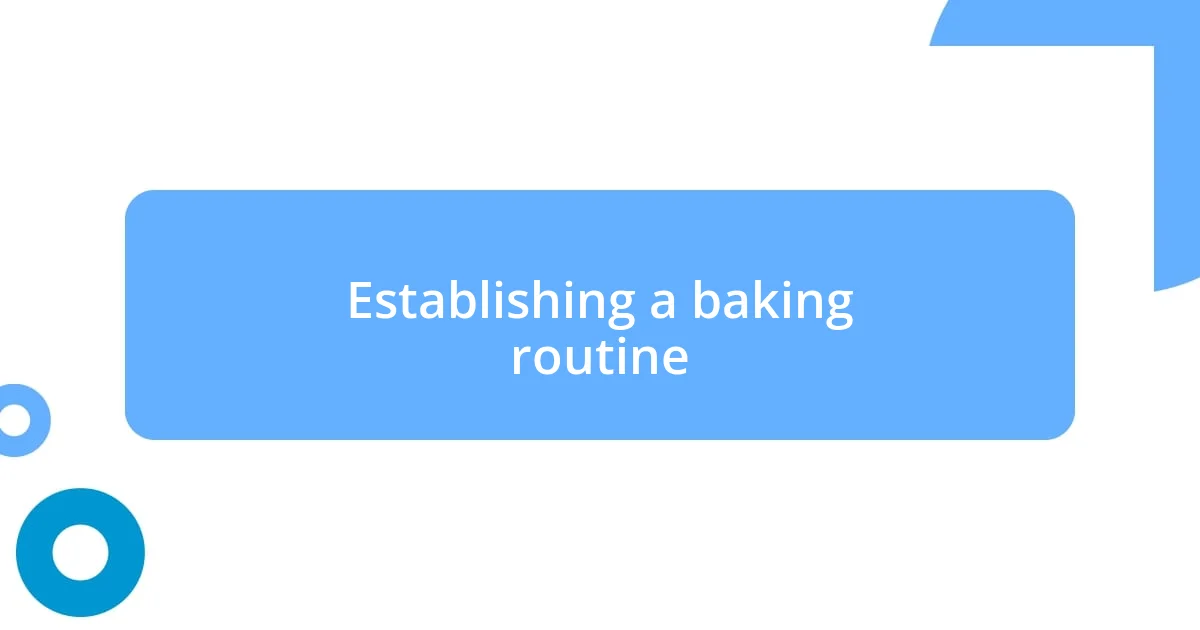
Establishing a baking routine
Establishing a consistent baking routine has transformed my approach to the craft. I started by setting aside a specific day each week just for baking. This dedicated time not only built anticipation but also allowed me to experiment freely without the pressure of a ticking clock. Have you found that creating a regular schedule can ease the anxiety of baking?
As I followed this routine, I noticed that familiarity breeds confidence. For instance, the first time I baked bread, I was overwhelmed—so many steps and so much potential for failure! But by the third week of my bread-baking day, I felt like a pro, rolling out dough as if I’d been doing it for years. Isn’t it fascinating how establishing a habit can elevate your skills almost effortlessly?
Moreover, I learned to prep my workspace in advance, which is key to a smooth baking experience. I now spend a few minutes organizing my ingredients and tools before I start. It’s like a warm-up for my baking brain! This simple step makes all the difference, allowing me to focus better on the creative process. Have you ever experienced that clarity that comes from a tidy space? It’s like inviting inspiration in along with the flour and sugar!
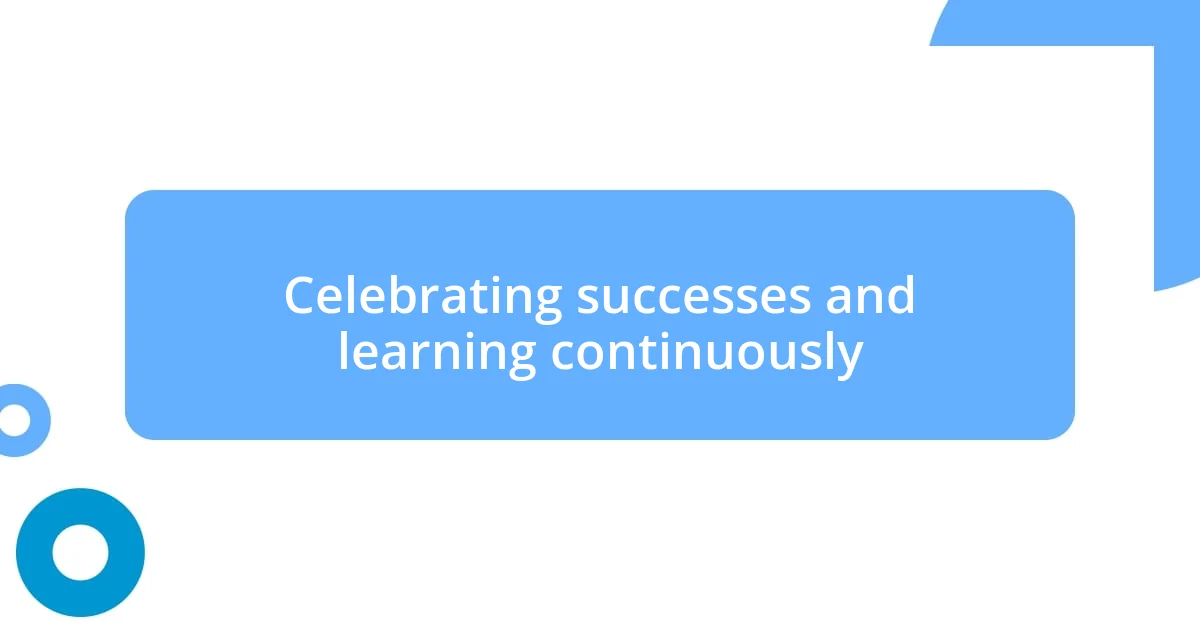
Celebrating successes and learning continuously
Celebrating my baking successes has become a pivotal part of my kitchen journey. I remember the sheer joy of pulling my first batch of perfectly risen cupcakes from the oven. They were a little lopsided, but the taste was spot on! That moment taught me to appreciate the beauty in imperfections. Have you ever experienced a small victory that felt monumental? Those wins, no matter how minor, fuel our passion for baking.
Learning from my experiences is just as important as celebrating them. There was a time when my lemon meringue pie turned out runny—definitely not a crowd-pleaser. Instead of giving up, I dug into the reasons behind my failure. Through research and experimenting, I fine-tuned my technique, eventually creating a pie that wobbled just the right amount. Isn’t it amazing how a baking flop can lead to a thrilling discovery? I now view each mishap as a lesson, leading me closer to mastering my craft.
In my baking, celebrating each success and failure has developed into a source of motivation. After finally nailing a multi-layered cake, I marked the occasion with a mini celebration, inviting friends over for a taste test. Sharing that experience made the hard work feel worthwhile. Whenever I feel frustrated, I remind myself that learning is a continuous journey. Are you enjoying the process of growth, too? It’s not just about the final product; it’s about every small step that leads us there.












